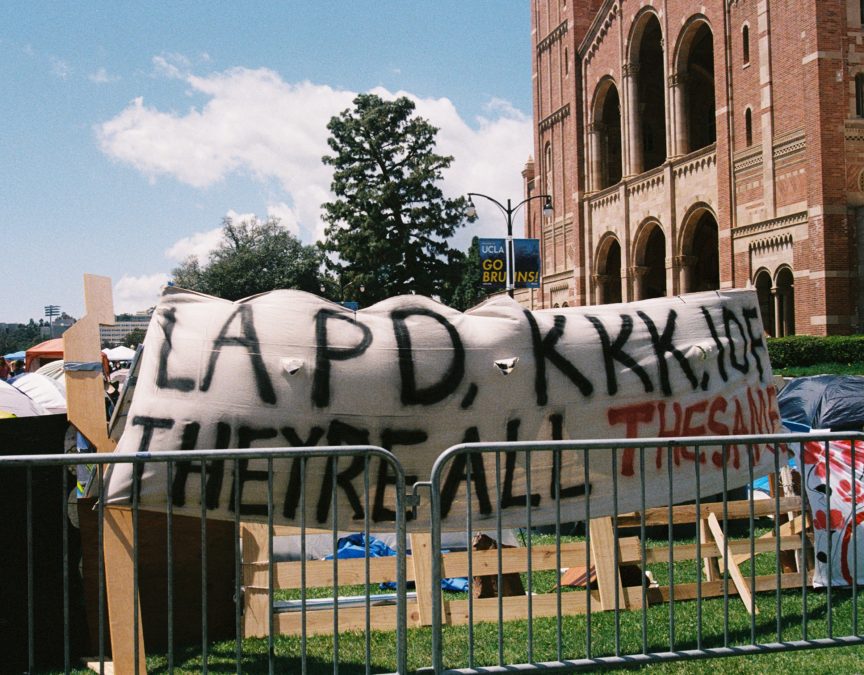The guidelines for the Public Expression Activities that were outlined within the Time, Place and Manner policies, which were released on Sept. 4, included statements such as, “Don’t conceal your identity with the aim of intimidating any person or group or to evade recognition“, “Don’t set up tents, campsites, or other temporary housing… on UCLA property”, and no distribution of food or access to specific walkways unless permitted by the university between midnight and 6 a.m.
Many of these policies are subjective and infringe upon the rights to free speech, neglect equitable access to food and housing security, violate public health and safety precautions, and only allow students to use two-percent of their campus space to express grievances about how their tuition dollars are spent. Students have a right to protest against the complicity of their university in the ongoing genocide against Palestinians and intimidation of the Global South. The administrative opposition to this intrinsic right has left students questioning who the university is actually trying to protect: the students or the zionists the administration funds?
According to William Ramataboe (he/him), a first year graduate student pursuing a masters in business association, there was no problem with these policies and nothing that violated human rights. Adding, “I read it quick so I might have skipped something” but this analysis simply cannot be true.
It is clear that the university administration does not view the students that fund UCLA as part of their communities of concern as they continue to wield their power to silence, intimidate and erase student voices and acts of resistance on campus. This brings us again to the question of fascism, ableism and the ever increasing presence of these institutions of violence in our lives. Fascism is understood as a political ideology that prioritizes the “good of a nation” above individual interests, “contempt for electoral democracy and political and cultural liberalism”, “forcible suppression of opposition” and “the tendency toward or actual exercise of strong autocratic or dictatorial control” according to Britannica and Merriam-Webster. Ableism is defined as “discrimination or prejudice against individuals with disabilities” (Merriam-Webster).
Working with these two definitions we can begin to understand the implications, of the Time, Place, and Manner policies, on the quality and freedom of student life and movements across campus. The university is actively working to protect economic interests, public image, and appeals to zionists at the expense of moral and ethical protections. With a ban on the ability to practice masking during an ongoing public health crisis (COVID) and only allowing protests in partially-inaccessible areas of campus, the university has now positioned itself in direct opposition to those fighting for disability-equity and justice. Additionally, this decision was made autonomously without the input of the students whose financial support acts as the bloodline of this university, meaning that the rights to cultural, political, and individual expression and determination can no longer function within this space. So whose university is it really?
Jonny Garnett (he/him), a fourth year undergraduate sociology major agreed with this analysis as he said that this was a “response [to] last spring protests that the school put in place to go against public expressions” He said, “I feel like everyone should have freedom to express themselves” and that this was “limiting people from calling out violations” adding that he did not “agree with them putting restrictions”.
While students have until Nov. 4 to express their opinions to the University on these policies at public comment, this decision has undeniably forced students to return to a more restrictive and censored campus environment.
For Afrikans at UCLA and across the globe, the topic of student protests, censorship and university policies are intrinsic to our universal experiences on campus. In times of hyper-surveillance, increasing fascism, and violations of human rights, the Time, Place and Manner policies and UCLA campus climate are only but a microcosm of the international struggles towards liberation and intersectional solidarity we all face.

